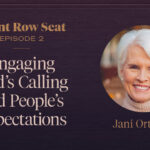Children are curious about marriage. They see families with various parental arrangements, and they have legitimate questions about them. Children need answers. And children deserve good answers—answers based on the eternal Word of God rather than shifting cultural trends.
As Christians, we must raise a generation that understands clearly and confidently the biblical vision for marriage—and why it matters. I wrote A Child’s First Book About Marriage to help equip children in their early years with the understandings they’ll need to stay true to Christ in their time.
How Children Learn
Young children absorb information most thoroughly through observation and imitation. Think of a baby’s first smile. Just a few weeks after their birth, most babies are happy to catch your eye and smile back at you.
Children need to understand that marriage isn’t what we think it should be. Marriage is what God says it is.
Children are impressionable and open to what the adults in their world say and do. If a child sees from his first days that marriage is a good gift from God, they’ll more readily long for that gift in the years ahead. If they learn God’s guidelines for marriage from an early age, they’ll be better prepared to develop a strong, Christ-centered marriage as an adult.
Equipping by Example
Begin teaching your children about marriage through example. If you’re married, give your children a living example of the unique and beautiful love that can grow between a husband and wife. Let them see you light up when your spouse walks through the door. Snuggle, kiss, hold hands—show them what it means to bind yourself to that one person who’s more special to you than anyone else in the world.
Let your children hear an abundance of loving words flowing between Mommy and Daddy: I love you, darling. I can’t wait to see you tonight. Thank you for marrying me. I missed you today. Fill your children’s senses with the delight of a father rejoicing in the wife of his youth (Prov. 5:18) and the security of a mother embracing her godly husband (Eph. 5:25).
Whether you’re married or not, expose your children to a variety of marriages that are solid, godly, and filled with joy. Talk to them about happy marriages you know, those of loving, selfless, committed couples. Give them real-life examples to help them believe God’s way is always best.
When possible, take your children with you to weddings. Prepare them beforehand to witness the beauty and significance of this sacred ceremony. Talk about the vows the bride and the groom make. Explain that when a man and a woman get married, they promise God they’ll stay together as long as they both live, no matter what.
Who Created Marriage?
Additionally, make sure your children know God created this good gift of marriage. Take them back to the Garden of Eden—to the first wedding. Help them understand that even with all the other creatures—even with the presence of God—there was still something missing for Adam.
The true story of how marriage began deserves to be familiar and captivating in every Christian home.
Look at Genesis 2:18 together. Even in the perfect Garden, something was “not good.” What was it? A man alone.
God knew Adam needed someone strong and kind and lovely—someone like him, but also different from him. God knew Adam needed a wife, and so he made the first woman and brought her to Adam, like the father of the bride (Gen. 2:20–22).
This true story of how marriage began deserves to be familiar and captivating in every Christian home.
Which Law Is Right?
As they grow, children come to understand that people get married all over the world. Each country has its own laws about what marriage is and who can get married. Help your children learn to distinguish between the laws of the land and the law of God. They aren’t always the same.
Your child will be confronted with relationships that go against the wisdom and purposes of God. Some countries say marriage can be between two men or two women, or that a husband can have more than one wife. People sometimes believe they’ll be happier if they decide in their own way what marriage can be.
But our children need to understand that marriage isn’t what we think it should be. Marriage is what God says it is, because God made us, and God made marriage for his own good reasons. Make sure your children grasp that God intended marriage to be between one man and one woman for life (Mark 10:6–9).
God’s Kind Gift
Marriage is an unconditional commitment to an imperfect person, and our own selfishness can often complicate that commitment. Sometimes we get angry, and we hurt the people we promised God we would love the most. Children need to see how to deal with anger and hurt within the bonds of marriage. They can learn that marriage is God’s good gift to help us become more selfless and more Christlike.
Sometimes we aren’t good at keeping our promises. Sin can harden our hearts, and we break our marriage vows. If divorce has intruded into your children’s experience, talk this through with them, assuring them of God’s nearness in their sadness (Ps. 34:18) and God’s help when family life is hard (Isa. 41:10).
Then bring the conversation back to hope for their own future. When they get married, it will be hard at times, but God will be with them.
Assure your children that marriage is God’s kind gift, and it comes to us filled with his blessing. Show them how marriage brings joy to adults and security for kids. And teach them that, best of all, marriage is an up-close display of the forever love of Jesus for his church, whom he calls his bride.
By God’s grace, our children can stand firm in their generation. What a privilege to teach them that God’s way is loving, and his way is always best.
Is there enough evidence for us to believe the Gospels?
 In an age of faith deconstruction and skepticism about the Bible’s authority, it’s common to hear claims that the Gospels are unreliable propaganda. And if the Gospels are shown to be historically unreliable, the whole foundation of Christianity begins to crumble.
In an age of faith deconstruction and skepticism about the Bible’s authority, it’s common to hear claims that the Gospels are unreliable propaganda. And if the Gospels are shown to be historically unreliable, the whole foundation of Christianity begins to crumble.



































